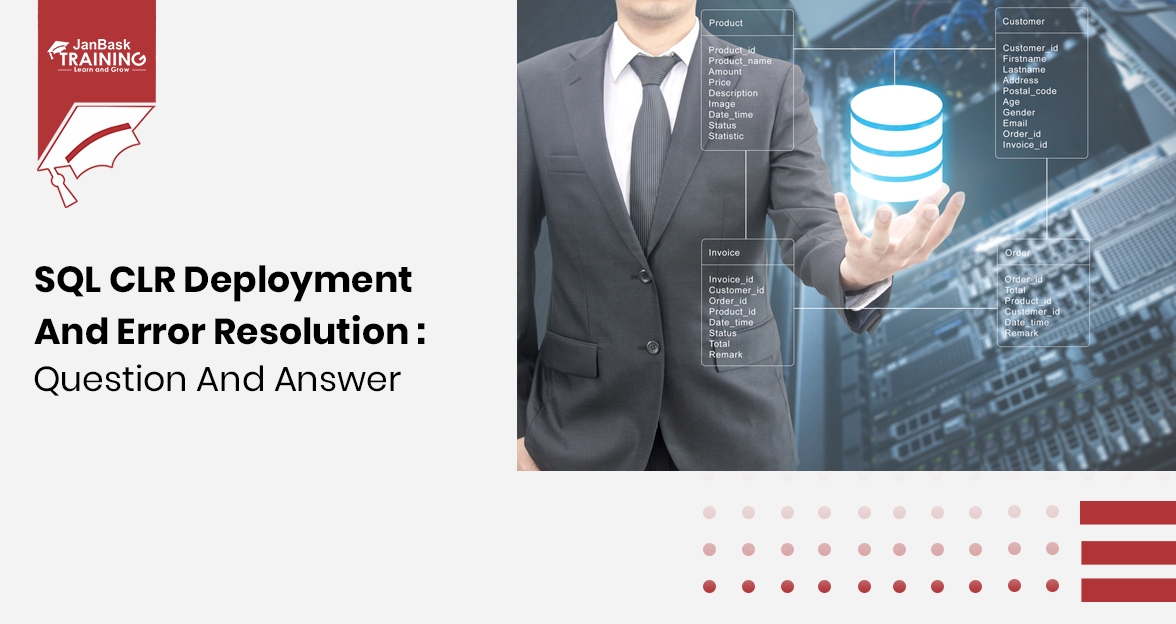 Grab Deal : Flat 30% off on live classes + 2 free self-paced courses - SCHEDULE CALL
Grab Deal : Flat 30% off on live classes + 2 free self-paced courses - SCHEDULE CALL

 Grab Deal : Flat 30% off on live classes + 2 free self-paced courses - SCHEDULE CALL
Grab Deal : Flat 30% off on live classes + 2 free self-paced courses - SCHEDULE CALL


To be effective with database-centric requests (which comprises all the requests Data Warehousing area), one must be sturdy and plentiful in SQL. In this article, we will study further SQL by flouting the topic in the method of numerous question-answer meetings usually asked in Conferences.
The below-mentioned SQL server interview questions for developers are really useful to crack the job interview.

Answer : A Database Management System (DBMS) is a database that assures the formation, upkeeping, and usage of a database. DBMS can be labeled as File Manager that accomplishes data in a database somewhat than convertible it in file arrangements.
Answer : RDBMS implies the Relational Database Management System. RDBMS hoard the information into the gathering of tables, which is linked by common fields amid the columns of the table. It also delivers relational operatives to operate the data stowed into the tables. For Instance: SQL Server.
Answer : SQL implies the Structured Query Language, and it is cast-off to interconnect with the Database. This is a normal language used to achieve tasks such as recovery, update, supplement, and removal of data from a database. The usual SQL Command is Select.
Answer :The database is nonentity but a prearranged procedure of data for informal access, storage, recovery, and handling of data. This is also recognized as an organized form of data that can be retrieved in numerous ways. For instance: School Administration Database, Bank Administration Database.
Answer : A table is a set of information that is prearranged in a framework with Columns and Rows. Columns can be considered upright, and Rows are flat. A table has quantified a number of columns called arenas but can have any quantity of rows which is named as the record.
Answer : A foreign key is a unique table that can be linked to the main key of an alternative table. Relationships have to be formed between two tables by citing foreign keys with the main key of an alternative table.
Answer : This is a keyword cast-off to query data from more counters founded on the relationship amid the fields of the tables. Keys piece the main role when JOINs are cast off.
Answer : There are numerous types of join that can be cast-off to save data and it depends on the association between tables. Following are the types of join:
Answer : Answer: An identity column in the SQL inevitably produces numeric standards. We can have well-defined a start and increase the value of the uniqueness column.
Answer : The procedure of table design to mineralize the data idleness is named normalization. We want to divide a database into two or additional tables and describe relationships between them. Normalization is the procedure of mineralizing idleness and dependence by establishing fields and counters of a database. The chief goal of Normalization is to add, delete or adapt fields that can be made in a solitary table.
Answer : There are mainly three types of data types in SQL Server
The sub-data types are meant for memory management. For example, Sex i.e. Male or Female will not require the same memory space as name or address.
Answer : Trigger permits us to implement a batch of SQL code when a table occasion occurs (Insert, appraise or delete command implemented against an exact table).
Answer : If applications or amenities have exposed ODBC influences to the SQL Server 2005 throughout the adaptation process, they might not permit the SQL Server to be closed totally. The conversion procedure will not continue to the subsequent step if it does not accept confirmation that the SQL Server has been totally still.
SQL Server Training & Certification

Answer: If the inheritance SQL Server occurrence is replaced by a new-fangled SQL Server 2008 example, rolling back an in-place advancement can be composite and inefficient, whereas in a side-by-side advancement the inheritance instance remains accessible if a rollback is desirable.
Answer: Denormalization is a method used to contact the information from higher to inferior normal methods of the database. It is also the procedure of presenting severance into a table by including data from the linked tables.
Answer: The usual forms can be alienated into 4 forms, and they are clarified below -.
Answer : A view is a simulated table that contains a subset of information limited in a table. Views are not practically contemporary, and it receives less space to stock. A view can have information on one or more tables united, and it is contingent on the association.
Answer : An index is a presentation tuning technique of permitting faster recovery of records from the table. A directory generates an entry for each value and it will be quicker to recover data.
Answer : There are three kinds of indexes -
Answer : Yes. Addition of CPUs can happen by totaling new-fangled hardware, rationally by online hardware separating, or practically through a virtualization layer. Preliminary with SQL Server 2008, SQL Server provisions hot add CPU.
Once the CPU is supplementary just run RECONFIGURE then SQL server distinguishes the afresh additional CPU.
SQL Server Training & Certification

Answer : The best method is side-by-side promotion. You can do this either by using the backup and reinstate method or detach/ascribe to the database files. I’d propose using the backup & restore as the harmless method. The steps are:
Answer : Yes. SQL Server 2005 databases are well-matched with SQL Server 2008. Ascribing a SQL Server 2005 folder to SQL Server 2008 mechanically promotes the SQL Server 2005 database to the last and the folder is then no longer serviceable by the SQL Server 2005 connection.
Answer : There are Magic Tables (virtual tables) in SQL Server that hold the temporal information of recently inserted and recently deleted data in the virtual table. INSERTED and DELETED are two types of magic tables in SQL Server. An INSERTED magic table is populated with INSERT and UPDATE operations and DELETED magic table is populated with UPDATE and DELETE operations.
The INSERTED magic table stores the before version of the row, and the DELETED table stores the after version of the row for any INSERT, UPDATE, or DELETE operations.
A magic table can be utilized in INSERT, UPDATE, and DELETE activity with the table in a trigger, which is the common understanding of people. SQL Server uses magic tables outside the TRIGGER also for a lot of other purposes too. Use of Magic tables in SQL Server with the usual update statement lessens the information dependency and makes your information consistent with your transaction.
Answer : Table variables are declared like standard tables. Only difference is that they are not permanent. The syntax for declaring a table variable is as below.
DECLARE @product_table TABLE ( ProductID int PRIMARY KEY NOT NULL, [Category Name] nvarchar(50) NOT NULL, [Subcategory Name] nvarchar(50) NOT NULL, [Product Name] nvarchar(50) NOT NULL, ListPrice money NOT NULL );
Since you can define a primary key in a table variable and by default primary key creates a clustered index, so indexing is possible in a table variable and that is clustered index.
Answer :
Trigger is not applicable only on tables. You can also implement triggers on views and triggers can also be implemented on databases as well. Below is an example.
CREATE TRIGGER LimitConnectionAfterOfficeHours
AS BEGIN IF ORIGINAL_LOGIN() = 'TestUser' AND (DATEPART(HOUR, GETDATE()) DATEPART (HOUR, GETDATE()) > 18) BEGIN PRINT 'You are not authorized to login after office hours' ROLLBACK END END
This particular trigger checks if a particular login id except Testuser is logged into the system even after a certain time of the day. If yes it logs out the person.
Advanced SQL Server interview questions will help to check your proficiency in the dat abase. The above content will help you crack your SQL Server interview. You can also register with JanBask Training to enroll for top-level training in technologies.

SQL Server MERGE Statement: Question and Answer


Mastering INSERT and OVER DML Syntax: Interview Questions Guide

SQL CLR Deployment and Error Resolution: Question and Answer

Cyber Security

QA

Salesforce

Business Analyst

MS SQL Server

Data Science

DevOps

Hadoop

Python

Artificial Intelligence

Machine Learning

Tableau
Download Syllabus
Get Complete Course Syllabus
Enroll For Demo Class
It will take less than a minute
Tutorials
Interviews
You must be logged in to post a comment